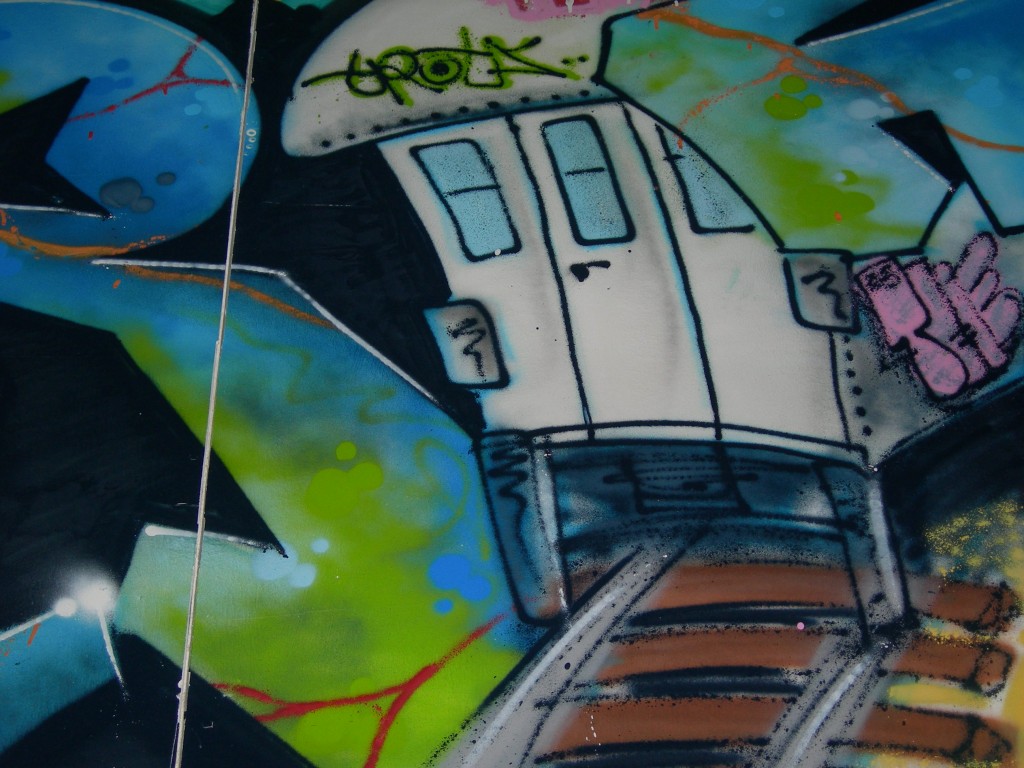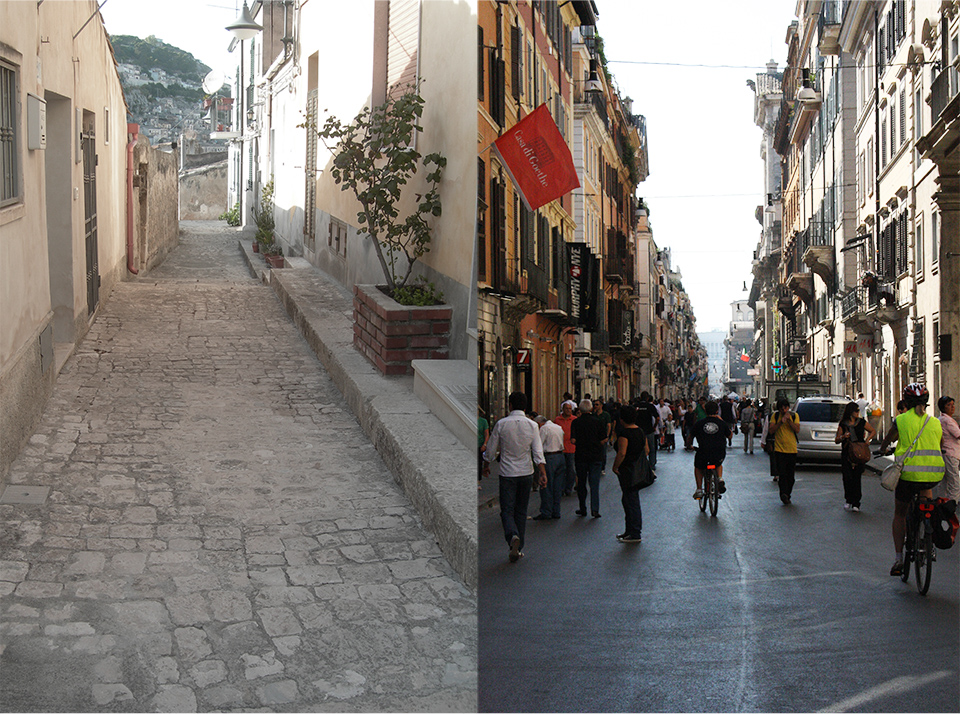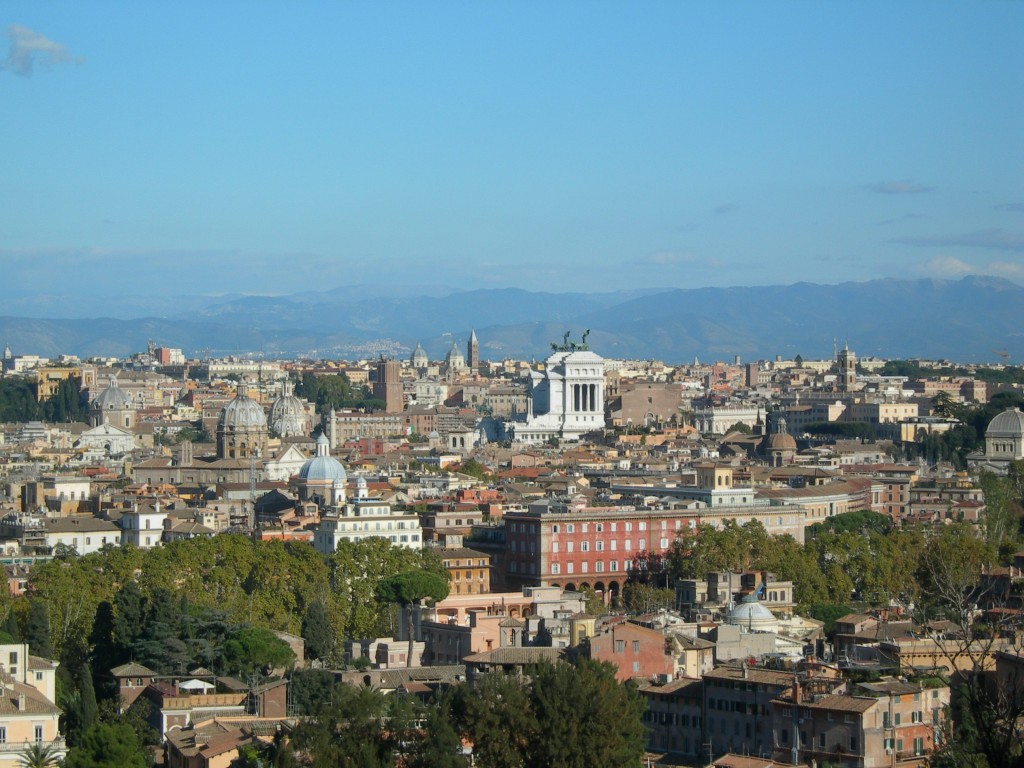LA CITTA’ E’ IL NOSTRO HABITAT
– dialogo platonico non noioso –
Perché la città?
Voci per strada e dal pianerottolo.

Cominciamo a parlare della città e del problema più cool al momento, quello delle periferie.
OC – La periferia fa veramente parte, secondo te, della città, intesa come identità complessiva, o è solo una questione politica, territoriale?
SDG – Ogni quartiere crea la propria identità. Ma ogni zona diventa, intimamente, “indipendente” in base alla “presenza” della città. Più una zona è isolata, lontana, “diversa” più si sente meno parte della città. Se in un quartiere abitano persone di una particolare estrazione sociale, o magari immigrati di una zona geografica precisa, si forma un vero e proprio ghetto. Se poi prendiamo dei casi particolari, come Corviale a Roma ad esempio, capiamo come ci sono state politiche che avevano come scopo unico quello di concentrare delle persone specifiche in un unico posto. Senza mixitè, si creano autonomamente delle identità separate. E come un figlio abbandonato, la periferia diventa insoddisfatta, anarchica, violenta.
OC – Sono convinto che la città dovrebbe essere di tutti. Perché, se è vero che non tutti hanno il potere di muovere azioni politiche di cambiamento, se non altro dovrebbero prendersi, quando non ce l’hanno, almeno il potere di vivere un luogo nella maniera giusta, il che non sarebbe poco.. in ogni caso penso che bisogna imparare a vivere bene la propria città prima di tutto, ma non sempre la gente ci riesce, (o ci prova) nella maniera adeguata. Quindi di conseguenza, spesso, non è padrona nemmeno da questo punto di vista. La città appartiene alla gente insomma: questa consuetudine storica è stata violata nel corso dell’ultimo secolo con l’avvento della pianificazione?
SDG – Secondo me la città non è più della gente, che una volta costruiva le case che abitava. È dei grandi costruttori, delle banche che danno i soldi al costruttore, del politico che decide dove si può costruire e come si deve costruire. Le case assumono un prezzo spropositato e costringono le persone a indebitarsi con le banche per decenni. La pianificazione è, letteralmente, controllo. In genere il controllo è positivo. Ma chi controlla i controllori? Come sperare che non ci siano influenze tra questi e chi detiene il potere economico? Insomma, chi gestisce la città?
OC – Bella domanda! Credo la politica sommersa, il che equivale a dire il denaro e le poche persone che ce l’hanno. La politica e i politici che si vedono in tv o in giro servono solo come specchietto per le allodole, e rappresentano un effetto collaterale o al limite di contorno del potere vero che rimane sempre in ombra. Il potere come tale è misterioso, occulto. Quello vero.
SDG – Alcuni pensano che il sistema industriale sia fallito, e che ci aspetta un futuro fatto da makers, sistemi di lavoro a dimensione più “umana” e “artigianale”. Ma ragionando senza pregiudizi, qual è la tendenza delle persone? Fare gruppo o rimanere da soli? Makers e industria sono inconciliabili?
OC – Sarebbe bello tornare a vedere in giro per la strade tante botteghe di makers; sembra di tornare indietro nel tempo se ci pensi un attimo. Magari ci vorranno anni, ma, se succederà e, credo che la direzione sia quella, di certo non mi dispiacerà.
Il discorso del lavoro singolo o di gruppo credo dipenda dalla tua cultura e di sicuro dagli stimoli che ricevi. A Roma o Milano mi sembra in apparenza più conveniente e protettivo fare gruppo anziché isolarsi in mezzo al caos. In una realtà più piccola si collabora lo stesso ma ci sono molti più lavoratori autonomi. Secondo te quali sono le differenze nel bene e nel male tra una città grande e una città piccola? Dammi tre motivi per andare a vivere in una città piccola e tre motivi per non andarci; fai lo stesso per la città grande.
SDG – È molto più facile in apparenza entrare in una piccola comunità piuttosto che in una grande. Si tratta di trovare un posto: un posto riconosciuto. Questo può avvenire sia nella piccola città che nel quartiere della grande città. Da questo punto di vista, la grande città è favorita; la città piccola non potrà mai possedere le differenze che ci sono nella grande. Quando si vuole “trovare un posto”, la “comunità” che si cerca è più facile trovarla nella grande città; il paesino invece tende a “tararsi” su unici valori. È un meccanismo innato, una comunità rimane forte se unita. Anche se nel male e nelle decisioni sbagliate. Potrei dire cose simili sulle possibilità di lavoro e di istruzione. Tre motivi per vivere in una piccola città? Dipende da te. Se sei disposto a “tararti” su valori indipendenti da te, se ti piace la tranquillità apparente, se ti piace la vita ordinaria, è un ottimo posto dove vivere.

OC – Certo è fuori discussione che una metropoli offra tutto e il contrario di tutto. L’unica cosa su cui non sono d’accordo è che la tranquillità apparente cui fai riferimento per la città piccola può in realtà essere per talune persone una tranquillità emotiva reale dovuta allo stile di vita che si riesce a condurre in alcuni posti piuttosto che in altri. Nella metropoli sei costretto a correre, non hai tempo per fermarti, per concentrarti. Puoi farlo, ma per alcuni è difficile, per altri impossibile. Non bisogna uniformarsi a un modello di società, su questo sono d’accordo. Infatti è utile ampliare i propri orizzonti viaggiando il più possibile.
SDG – Va bene ma Roma -e in generale la metropoli- ha già tutto, tantissime persone con progetti validi. A Roma quindi, devi per forza aderire a qualcosa di esistente (?) quindi: quale sarebbe il tuo posto nella città?
OC – Non so se Roma abbia già tutto: così essa lascia intuire. Ma vedi, secondo me in una città come la capitale è davvero abbastanza improbabile afferrarne tutti i movimenti e le tendenze, mentre magari la stessa cosa si potrebbe fare in maniera più pratica in una città di modeste dimensioni. Voglio dire: mentre una piccola città si assimila in tempi brevi, la metropoli richiede un tempo enorme. E talvolta dopo anni, ti ritrovi al punto di partenza e hai la netta sensazione di dover ricominciare tutto il tuo percorso di apprendimento (diciamo così) daccapo… Personalmente, non ho avuto il tempo di abbracciare Roma in maniera esaustiva, e sarebbe strano il contrario. Proprio per i motivi che ho citato, cioè per la dilatazione delle distanze fisiche e temporali, non mi sono mai posto nemmeno il problema di aderire a qualcosa, movimento o gruppo definito. I tempi si sono dilatati parecchio, e mi sono ritrovato sempre a dover ricominciare daccapo. Appunto.
Forse Roma richiederebbe un approccio più aggressivo, più programmatico e meno improvvisato, ma è sempre molto difficile, e sotto diversi aspetti, rendersi conto di cosa sia oggi la Città Eterna. Viaggiare in ogni caso è la miglior ricetta: più ci si muove più si ha la possibilità di conoscere in maniera globale un luogo geografico e, di conseguenza, capire cosa in esso manca facendo, manco a dirlo, il confronto con altre realtà estere.
Il mio posto nella città sono le piazzette e le stradine dove non passano macchine ma solo gente e magari hai la possibilità di aderire al luogo sedendoti sulla scalinata di una chiesa con un bicchiere in mano. Qual è il luogo in cui riesci a percepire meglio il contatto con la città in cui vivi?
SDG – Ogni volta che mi trovo in un luogo affollato, mi sento dentro la città. Nel mercato rionale, nel supergrandemagazzino. Nel tram iperaffolalto. Non ho mai percepito la città per le strade o al parco. Al parco le persone si comportano “alla luce del sole”, i paramenti murari dei palazzi nascondono, a pochi centrimetri da me, cose indicibili che avvengono nell’intimità. Quando il luogo è davvero affollato, senti qualcosa di intimo. Senti il sudore e l’odore di fumo. Intuisci qualcosa. La città è un insieme di persone.
OC – Parliamo della relazione diretta tra il luogo e la persona: il posto dove passiamo la maggior parte del nostro tempo ci rappresenta in qualche maniera…E in che misura, mi chiedo, la forma e la struttura urbanistica di una città possono formare il carattere e lo stile di vita delle persone che ci vivono?
SDG – Senza volerlo ho risposto prima. Non mi sembra un caso che gli italiani adorino le piccole città. Da sempre, fin dal medioevo. Sono il perfetto habitat per la loro natura.
OC – Anche qui non sono del tutto d’accordo. Gli Italiani così come altri popoli hanno sempre descritto numerosi flussi migratori sia verso i borghi di modeste dimensioni sia verso la metropoli tanto ambita, luogo del desiderio per eccellenza. Dipende dal periodo storico, dalla convenienza. All’estero ha funzionato più o meno in maniera analoga e inoltre, voglio dire, nella maggior parte dei paesi europei c’è la stessa proporzione di metropoli e paesini che esiste nel nostro paese..
SDG – È però qui in Italia che avverto una sorta di spirito che altrove non ho trovato.. qualcosa a metà tra l’odore stantio di una bottiglia rimasta chiusa con qualche goccia d’acqua per degli anni, e la polvere negli occhi. Parlo del Genius Loci (almeno credo). Per noi progettisti si pone un problema: se progetto come lo rispetto il genius loci? Come lo riconosco? E poi: Lo rispetto o lo cambio magari in meglio? È mio o di tutti?
OC – Il genius loci è fatto in buona parte degli attributi di cui abbiamo già parlato: la cultura, i costumi.. e quindi comprende molti fattori che vanno capiti, analizzati. Questa comprensione avviene anche in maniera inconsapevole a volte. Faccio un esempio: tu hai bisogno in media un anno per ambientarti in un determinato posto. Allora, nell’arco di questo periodo, come fai ad essere sicuro che non sia il genius loci ad essersi impossessato di te? Già dopo tre mesi parli con un accento diverso da quello tuo di origine. Inizi magari facendo il turista, e quello è un ottimo modo per giudicare (o progettare) il genius loci. Ma poi a mano a mano perdi quella veste di osservatore e inizi a diventare cittadino. Allora avresti bisogno di staccare la spina, di un periodo di vacanza da quella città per poterci tornare un’altra volta depurato e, di nuovo, da turista. Il discorso è molto stimolante: credo bisogna sempre provare ad osservare le cose da un punto di vista differente…quando crediamo di conoscerle, come insegna il meraviglioso professor Keating ne’ L’attimo fuggente.
Sebastian Di Guardo
Orazio Caruso

THE CITY IS OUR HABITAT
– Platonic dialogue not boring –
Why the city ?
Voices on the street and from the landing .
Let’s start to talk about the city and the coolest problem of our time: the suburbs.
OC – Do you think suburb really belongs to the city, means as the overall identity , or is it just a political, territorial issue?
SDG – Each district creates its own identity . But every area becomes on itself, “independent” according to the “presence “or less of the city . More an area is isolated, far away, ” different “, more you feel less part of the city . If people live in a neighborhood of a particular social class , or maybe immigrants, it forms a real ghetto . If we consider the special cases, as Corviale in Rome for example , we understand how there were policies that were aimed only to concentrate some people in one single place . Without mixitè, come out their own separate identities. And as an orphan child, the suburb becomes unsatisfied, anarchist , violent .
OC – I believe that city should be common. Because, if everyone hasn’t the power to move policy actions for change, should takes at least , the power to live a place in the right possible way , which would be enough . Anyway I think that it should learn the right living own city, first of all. But not always the people can, (or trie) in right way. Often aren’t able even from this point of view . Anyway, the city belongs to the people: this historical tradition has been violated during the last century with the coming of planning?
SDG – I think city is no longer of the people who built once the houses that lived. It’s city of great builders, banks that give money to the manufacturer, the politician who decides where you can build and how you should build . The houses become too expensive and force people to get into debt with banks for decades . Planning is control, really. Typically the control is positive . But who controls the inspectors ? How to hope that there are no agreements between them and those who hold economic power ? I mean, who manages the city?
OC – Good question ! I think the underground politic, meaning the money and the few people who hold it . Politics and politicians that you see on TV only serve as a decoy, and are a side effect or the edge of the true power that is always in the shade. The power is mysterious , occult . The real one.
SDG – Some think that the industrial system has failed, and it comes a future made by makers, work systems in size more ” human ” and “craft ” . But, without prejudice, what the people aspire to? To pool or to work alone? Are they opposite, Makers and industry?
OC – would be nice to see around the streets many shops of makers ; seems to go back in time if you imagine it . Maybe it will take years , but if it happens , and I think this is the one direction, I’m certainly not sorry.The matter of the individual or team work depends on your culture and I think from imputs you receive. In Rome or Milan supposedly seems more convenient to make a team instead isolate themselves in the chaos . In a smaller city, works are the same but there are many more self-employed. In your opinion, what are for better or worse the differences in a big city and a small town ? Tell me three reasons to go live in a small town and three reasons to not do it; do the same about the big city.
SDG – At first sight is easier to get into a small community rather than in a large one. It’s about finding a place: a recognized place . This can be done both in the small town and the the big city district. From this point of view, the large city is favored ; the little town will never owns the differences that there are in the metropolis . When you want to ” find a place “, “community” is easier to find it in the big city; instead the village tends to set on unique values . It is a natural mechanism: community remains strong when joined. Although for worse and wrong decisions . I could say similar things about working and education. Three reasons to live in a small town ? It depends on you. If you’re willing to set yourself on values independent from you, if you like the apparent quiet, if you like the ordinary life, is a great place to live.
OC – Of course there is no question that a metropolis offers everything. The only question on which i disagree is that the apparent quietness you refer to the small city can actually be for some people a real emotional tranquility, due to the lifestyle that you can lead in some places than in others. In the metropolis you are forced to run, you don’t have time to stop, to apply . You can do it, but for some it’s difficult, for others impossible. We mustn’t conform us to a model of society, I agree on that. In fact, it’s useful to broaden our horizons by traveling as much as possible .
SDG – Ok, but Rome – and in general the metropolis already has everything, a lot of people with good projects. In Rome, i mean, you have to adhere to something existing (?) Then: what would be your place in the city?
OC – I don’t know if Rome has it all: so it suggests. But, you know, I think in a city like the Capital is really impossible to embrace all the movements and trends, and maybe the same thing could be easier in a little city. I mean, while a small town is testable in a short time, the metropolis requires a huge time. And sometimes after years, you may find yourself at the starting point, and you have the feeling of having to start all over again… Personally, I haven’t had enough time to embrace Rome exhaustively, and it would be strange otherwise. That is, for the expansion of the physical distances and time, i never raised the question of joining something, movement or defined group. The times have been stretched a lot, and I found myself always having to start all over again. Exactly. Perhaps Rome would require a more aggressive approach, more programmatic and less improvisation, but it’s always very difficult, by several aspects, to realize what the Eternal City is today. To travel anyway is the best strategy: more you move, more you have the opportunity to learn in a comprehensive way a place and, therefore, to understand what it lacks doing, necessarily, the comparison with other foreign cities.My place in the city are the squares and streets where are no cars but only people and maybe you have the chance to join the site by sitting on the steps of a church holding a glass. What is the place where you can get in touch with the city in which you live?
SDG – Every time I’m in a crowded place, I feel inside the city. In the local market , big-super-market, in overcrowded tram. I’ve never get in touch with the city when i’m on the streets or in the park. At The Park people behave “under the sunlight “; the facing walls of the palaces hiding, very close to me, unspeakable things happen in the intimacy. When the place is busy, really you can feel something intimate. Feel the sweat and the smell of smoke. Something you guess. The City is people meeting.
OC – We talk about the direct relationship between the place and the person: the place where we spend most of the time is our representative … I asking to you: how much the shape and structure of an urban city can forming the character and lifestyle of the people who live there?
SDG – I said befor . It’s not a case that Italians adore small towns. Always, since the Middle Ages, these are the perfect habitat for their way to be.
OC – I’m not completely agree. The Italians as well as other peoples have always described numerous migration as towards the villages of modest size as to the coveted metropolis, the craved place. It depends on the historical period, from the convenience. Abroad, it worked almost in the same way and also, in most European countries, there is the same balance between metropolis and villages that in our country..
SDG – But it is here in Italy that I feel a kind of spirit that I have not found anywhere else.. something between the musty smell of a closed bottle with a few drops of water for years, and the dust in the eyes. I’m talking about the Genius Loci (I think at least). For us designers there is a problem: if i project, how i should relation with the genius loci? How to recognize it? And then: I respect it or maybe change for the better ? It’s mine or common?
OC – The genius loci consisting most of the attributes of which we have already spoken: the culture, customs .. and therefore includes many elements that we need to understood, analyze. This appreciation sometimes happens unconsciously. For example: you need a lot of time to settle in a certain place. Then, during this period, how can you be sure it’s not the genius loci to having possessing you? Already after three months you speak with a different pronunciation from your. Beginning perhaps sightseeing, and that’s a great way to judge (or design) the genius loci. But then gradually you lose the original capacity to observe and start to become a normal citizen. Then you’d need to detach, an holiday period to be able to come back another time and purified, again, as a tourist . The speech is very exciting: I think we always should try to look at things from a different point of view… when we think we know them, as taught by the wonderful Mr. Keating on Dead Poets Society movie.
Sebastian Di Guardo
Orazio Caruso
Translations by Orazio Caruso
